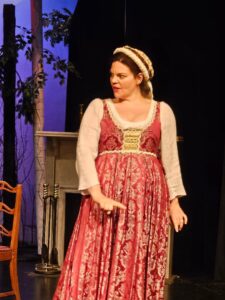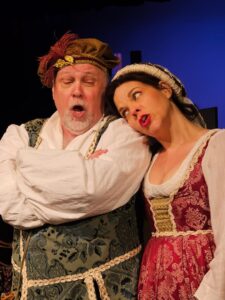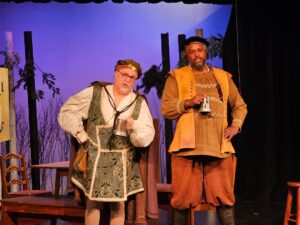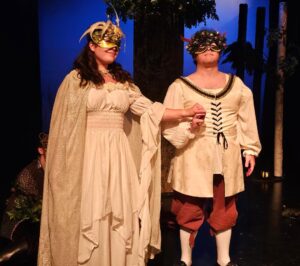The Merry Wives of Windsor
Otto Nicolai (Composer); Salomon Hermann Mosenthal (Original Libretto);
Donald Pippin (English Version, Libretto)
Based on Play by William Shakespeare
Pocket Opera

With a measure of self-worth and a confidence in his own attraction to the fairer sex that are almost as mammoth as his rotund belly, Shakespeare’s Falstaff has through the centuries continued to be a favorite of playwrights, composers, filmmakers, and especially audiences of all types. In the original The Merry Wives of Windsor, Falstaff has the inflated view of himself severely tested as with unashamed gluttony he pursues not one, but two wealthy, married women – women who will turn out to be much the more clever and creative in their own schemes to teach Sir John a lesson he will never forget. Otto Nicolai shines the spotlight on the two wives – Alice Ford and Meg Page – in his 1849 opera by the same name as the Bard’s play (with libretto by Salomon Hermann Mosenthal). Pocket Opera is currently staging Nicolai’s version of the famous tale with an English translation by the company’s founder, Donald Pippin, in an entertaining, musically impressive outing starring two incredibly talented wives who continuously steal the show from start to finish.

Mrs. Alice Ford is appalled as she reads a note declaring “for you I yearn, with love I burn” from a man she describes as “a walking tub of butter,” none other than of course Sir John Falstaff. Her reading of the note and her increasingly annoyed reactions are our first chance to be enthralled by the power and beauty of Rena Harms’ soprano voice. As her expressive eyes pop and snap their own clear messages, Mrs. Ford sings, “O just you wait, for this you’ll suffer; with me you dare to play the lover.” Already we are witnessing Rena Harm’s notes that lyrically flutter and vibrate ever so slightly for wonderful emphasis on tones sustained.
Before she can yet formulate her plan against the ego-inflated Falstaff, in walks her neighbor and friend, Mrs. Meg Page, immediately to read a likened proposal from “the biggest boob in Britain.” With a soprano voice well-grounded and musically revealing, Marcelle Dronkers brings big personality; a fabulous array of smirks, smiles, and facial scrunches; and an ability to draw many laughs while also always impressing with her vocal prowess. As the two wives compare their exact same propositions and begin to devise their plan of revenge, their combined runs of sung notes blend splendidly while also providing much humor. Their spoken and sung rehearsal session of how they will dupe the soon-to-visit “ton of pudding” is total fun as Mrs. Page mimics with full aplomb the Humpty-Dumpty-shaped solicitation of illicit love from a hamming-it-up in voice and countenance, Mrs. Ford.

But Falstaff is not the only fool Alice Ford must deal with from the male gender. Her own husband is beside himself in jealousy; and Falstaff’s visit gives her a chance to begin teaching Mr. Ford a well-deserved lesson. A note sent to him warning him of a lover’s visit to his wife sends Mr. Ford rushing home in rage, ready to tear the house apart looking for the supposed lover – a feat he will unfortunately (for him) repeat as the wives continue to plot how to outsmart both Falstaff and Ford. Jonathan Spencer sports a strong, captivating baritone voice that pierces the air with Ford’s ill-founded temper and accusations, only to be countered by his wife’s flowing notes of feigned sorrow (meant to stamp eventual guilt into the falsely accusing husband). An opening second act repeat when Mr. again supposedly surprises Mrs. in another set-up encounter by the wives to humiliate both husband and the Knight, Mrs. Ford’s trumpeting notes roll in waves to mock Mr. Ford’s pointed notes of accusation sung with full bombast and bluster, making for us as an audience a hilarious scene full of musical excellence. In each supposed surprise entrance that in fact has been arranged by the wily wives, there is of course no Falstaff because they have pre-planned how to dispose of him right under the nose of Ford himself.

The fat-bellied Falstaff is played with a walking waddle and a resoundingly rich and deep bass voice by Kenneth Kellogg. His Falstaff plays a much smaller part in this version of his story than, for example, in Verdi’s opera, Falstaff; and most of the time we see him, he is actually not full of the laugh-out-loud antics seen in other versions of the same tale. But this Falstaff’s vocals do impress with echoing depths and the ability to boom the Sir John’s bloated bluster.
Between Falstaff’s unwanted dips in the Thames and thrashings when disguised as an old woman named Mother Prattle – both schemes of the wives to exit him quickly just as an outraged husband Ford arrives hoping to find his wife in another man’s arms – a different tale of intrigue, planned deceit, and love is occurring. Mr. and Mrs. Page have a daughter, Anne, ready for the marriage altar. A somewhat proper and pompous Mr. Page (Steve Kahn) plans to marry Anne to a rather silly and cowardly (but also quite wealthy) squire named Slender (sung by accomplished tenor, Max Ary). But Mrs. Page’s idea of the perfect match is a rather ridiculous Frenchman, Dr. Cajus, played with clownish muster and sung in an affected, caricatured accent by Wayne Wong. Neither is the choice of young Anne; her heart is set on the Page’s penniless employee, Fenton – a choice both parents agree is totally unacceptable.

The opera’s more romantic, soaring numbers of love occur when either the vibrant, strikingly clear tenor of Michael Desnoyers or the emotion-packed, vibrato-rich soprano of Abigal Bush ring forth as the would-be lovers, Fenton and Anne, respectively. They too plan their own tricks to thwart Anne’s parents’ ill-founded plans for her matrimony and also to send the two unwanted solicitors of her hand running for the hills.
As often happens in any Shakespeare-conceived tale, the forest becomes the setting to set all aright – in this case their desired matrimony, the full reconciliation of the Fords, the satisfaction of the Pages, and even a universal forgiving (of sorts) of a much-humbled Falstaff. But none of this happens until Stage Director Phil Lowery and Costume Coordinator Lance Müller put their heads together to create a scene full of masked, feathered and leaf-netted elves, imps, and insects out to torture yet more time a fully frightened Falstaff who falsely thinks he is finally going to have his just dessert of two willing wives.
That final scene of sung and acted chaos in the woods is first set up by a beautifully balanced and harmonic quartet (Jayne Diliberto, Leora Gilgur, Michael Villareal, and Ian Harris) singing a haunting “O starry night, pale moon’s domain; where fears take flight and lovers reign.”
Music Director Robby Stafford serves as pianist and conductor of the ten-person orchestra, an ensemble where strings and winds and one lone horn combine to superbly master Nicolai’s score. That is particularly true during the musical variations of the captivating, absorbing Overture – one that inspired the 1954 Oscar for Best Short Subject film.
Even with two wives who ensure all their scenes are winners, there are times when the one hundred fifty minutes of the two acts (plus twenty-minute intermission) seem to draw out a bit too long. Some scenes are just not as effective as they could be and in fact are just too silly without being that funny (e.g., a bar-song scene between Falstaff and the locals). Falstaff himself also fails to milk the potential humor that the role’s mere presence and comic expressions/antics often render.
But with only one performance remaining next weekend of Pocket Opera’s The Merry Wives of Windsor, admirers of an opera where scenes and songs are shared in an intimate setting should make their way to relish especially the stellar performances of two wives who prove themselves much the more savvy than the ridiculous men around them.
Rating: 3+ E
The Merry Wives of Windsor continues on Sunday, June 30, 2024, in performance by Pocket Opera at the Legion of Honor Museum, San Francisco. Tickets are available online at https://pocketopera.org or by phone Monday – Friday, noon – 4 p.m. at 415-972-8934.
Photo Credits: Courtesy of Pocket Opera
